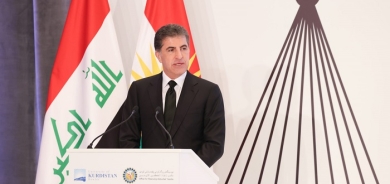Obama signals Russia may shift stance on al-Assad, Islamic State

Istanbul (dpa) - Russia will eventually change its stance supporting Syrian President Bashar al-Assad, US President Barack Obama said Tuesday, but urged Moscow to already focus its airstrikes in Syria on the Islamic State, as the extremist group is a universal threat.
However, he cautioned that Moscow is deeply invested in al-Assad and was not about to shift its position in the near future. Russia will therefore continue to launch strikes against Syrian rebel groups, including ones supported by the US and its allies.
While taking part in climate talks in Paris, Obama also focused on efforts to resolve a growing row between Russia and Turkey over the downing of a Russian jet last week, saying the two nations needed to focus on the Islamic State, which is the "common enemy."
The key to resolving the Syrian crisis remained a diplomatic push to get al-Assad out of power, Obama said, stressing the Syrian president would not be able to end five years of civil war which have devastated the country.
"Regardless of how you feel about Mr Assad, and I consider someone who kills hundreds of thousands of his own people to be illegitimate, but regardless of the moral question, as a practical matter it is impossible for Mr Assad to bring that country together," Obama said.
The US has been sharply critical of Russia, which so far has focused much of its air power in Syria since September on attacking rebels opposed to al-Assad, rather than the Islamic State group, but Obama reiterated that Moscow remained vital to the political process.
Major powers met in Vienna last month, agreeing on plans to map out a path towards a negotiated solution to Syria, including elections. A meeting of the various Syrian opposition groups is scheduled for later this month in Saudi Arabia.
"I'm confident that we are on the winning side of this and that ultimately, Russia's going to recognize the threat that ISIL poses to its country, to its people is the most significant and they need to align themselves with those of us who are fighting ISIL," Obama said, using an acronym for the extremist group.
Obama, who has been under some pressure home for not doing more to defeat Islamic State, vowed the US would keep up its aerial campaign against the extremist group.
On the sidelines of the Paris talks, Obama also met with Turkey's President Recep Tayyip Erdogan, trying to de-escalate tensions after the Turkish military shot down a Russian Su-24 bomber on November 24 over the Turkish-Syrian border.
Since the downing of the Russian plane, Moscow has slapped sanctions on Ankara. Russia is Turkey's second-largest trading partner.
The sanctions, much of which will enter into effect next month, will hit food exports to Russia, visa free travel and the hiring of Turkish workers. Some business deals will also be affected.
Turkish construction companies have a significant role in Russia and tourism is a major source of revenue for Turkey.
Russian President Vladimir Putin has also accused Turkey of buying oil from Islamic State, something Erdogan sharply rebuffed, pledging to step down if the accusation was proven true. He implied Putin should do the same if his accusations were proven false.
The tensions between the two strongmen have been long-running, with Turkey backing opposition groups and rebel factions in Syria while Russia supports al-Assad. Despite this, economic ties have continued and to some extent been strengthened in recent months, until the incident last week.
Turkey charged that the jet had violated its airspace, while Russia insisted the plane did not leave Syria. The US, while urging calm, has backed Ankara's technical assessment that the plane did cross over into Turkish territory.
All the countries are opposed to the Islamic State, which controls large swathes of territory in both Syria and Iraq, including a stretch along Turkey's border.
Turkey, a member of the NATO alliance, is also part of the US-led coalition battling Islamic State, but has faced charges that it had been reluctant to crack down on the extremist group and turned a blind eye to extremists heading to fight in Syria.
There were repeated reports in the past from Turkey's border with Syria that Islamic State was smuggling oil to underground dealers in the country, though Ankara has since stepped up its border security.














